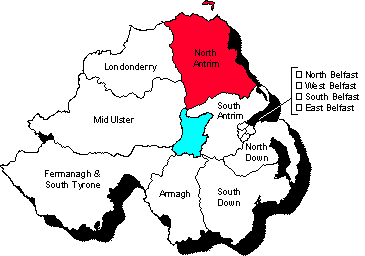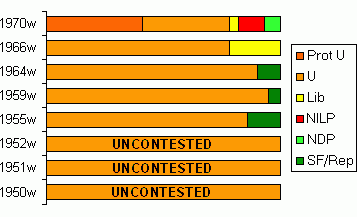

 |

|
|
|
|
|

|

|
| Map and diagram by Conal Kelly | |
Located in the largely rural north-western corner of Northern Ireland, this constituency was established in 1948 and incorporated the northern portion of the old county Antrim two-seat constituency. Between 1950 and 1970 the constituency was represented by four different MPs (3 Unionist, 1 Protestant Unionist). The general elections of 1950 and 1951 went uncontested, as did a by-election in 1952. The declared winner in each case was the sole Unionist nominee.
See also election results for North Antrim 1973-1982, 1983-1992 and 1993-2007.
| Prot U | U | Lib | NILP | NDP | SF/Rep | |
| 1970w | 41.2% | 36.6% | 3.9% | 11.0% | 7.4% | |
| 1966w | 78.1% | 21.9% | ||||
| 1964w | 90.1% | 9.9% | ||||
| 1959w | 94.9% | 5.1% | ||||
| 1955w | 86.0% | 14.0% | ||||
| 1952w-b | * | |||||
| 1951w | * | |||||
| 1950w | * |
* The only candidate nominated for the 1950 and 1951 General Elections was Unionist Sir Robert O'Neill. The only candidate nominated for the 1952 By-Election was Unionist the Hon. Phelim O'Neill. In each instance the sole candidate was therefore duly elected without a contest.
Protestant Unionist majority: 2,679; electorate: 79,930; votes cast: 73.4%
Clark
again stood for election in 1970, seeking a fourth consecutive term.
Although facing no less than four opponents, Clark's principle
challenger was the firebrand Protestant cleric Ian Paisley. Paisley’s
reputation had grown with his ‘O’Neill Must Go’ campaign and he had
been elected to Stormont two months earlier in a by-election caused
by O’Neill's elevation to the House of Lords. In what was a major blow
to the Unionist establishment, Paisley out-polled Clark by some
2,600 votes and became the new MP for North Antrim.
Paisley would later establish the Democratic Unionist Party (DUP) in
1971. Alasdair McDonnell the NDP candidate would later contest the
South Belfast constituency for the SDLP in
every Westminster election from 1979 onwards. He was finally elected
to Westminster in 2005. PJ McHugh had also contested the Bannside
by-election won by Paisley.
Unionist majority: 22,986; electorate: 72,039; votes cast: 56.7%
Seeking a third consecutive term, the incumbent Clark once again defended his seat in the 1966 general election. His opponent was Richard Moore representing the Liberal Party. North Antrim was one of three seats contested by the Liberals in 1966. Clark achieved a comfortable victory, although his majority was reduced to just under 23,000. The result gave both the Unionists and the Liberals their best result of the election.
Unionist majority: 35,948; electorate: 70,779; votes cast: 63.3%
Clark again represented the Unionist Party in North Antrim seeking his second successive win. His opponent on this occasion was John Caughey, standing on a Republican abstentionist ticket (Sinn Fein were now a proscribed organization). The result was never really in doubt with Clark capturing over 90% of the poll, although his majority was reduced slightly to just under 36,000. This represented the best result for the Unionists in the 1964 election. Caughey managed to improve on the Sinn Fein result of 1959 but still short on their 1955 performance.
Unionist majority: 40,527; electorate: 69,880; votes cast: 64.5%
Having been successfully returned to the Northern Ireland House of Commons for North Antrim in 1958, Phelim O'Neill did not contest the 1959 general election. He would later serve in the Northern Ireland Government as Minister for Education in 1969 and Minister for Agriculture 1969-1971. In 1972 he joined the Alliance Party of Northern Ireland, and sat in the House of Lords as the second Lord Rathcavan from 1982 until his death in 1994.
O'Neill was replaced on the ticket by Unionist Henry Maitland Clark. As was the case in 1955, John Dougan of Sinn Fein was the sole opposition. Clark was the easy victor, improving on his predecessor's 1955 result. The Sinn Fein vote dropped dramatically here as elsewhere in Northern Ireland, in light of the IRA's divisive Operation Harvest campaign.
Unionist majority: 34,954; electorate: 67,315; votes cast: 72.2%
The Unionist incumbent, Phelim O'Neill, had been elected in a by-election in 1952. This time, however, he faced his first electoral contest, with Sinn Fein's John Dougan as his sole opponent. In fact this was the first contest in North Antrim since it had been established some five years earlier. In the end, the result was a clear victory for O'Neill with a massive majority of almost 36,000.
Unionist Candidate Elected Unopposed.
Sir Robert William Hugh O'Neill resigned his seat in 1952 after 37 years as an MP. He was created the first Lod Rathcavan the following year, 1953, and died aged 99 in November 1982. In the resulting by-election, his son Phelim O'Neill was nominated as the Unionist candidate. As the sole nominee he was duly elected without a contest.
Unionist Candidate Elected Unopposed.
As was the case
in 1950, O'Neill was the sole candidate nominated in North Antrim and
was duly elected without a contest once more. North Antrim was one of
four seats that went uncontested in 1951 general election in Northern
Ireland. The sole nominee (and hence winner) in each instance was the
Unionist candidate.
Having been successfully returned, O'Neill became Father of the United
Kingdom House of Commons from 1951 to 1952.
Unionist Candidate Elected Unopposed.
The 1950 general
election saw the elimination of the Antrim two-seat constituency which
was replaced by North Antrim and South Antrim. The Unionist candidate
was Sir Robert William Hugh O'Neill who had represented the Antrim
constituency since 1922 and before that Mid Antrim from 1915. He had
succeeded his brother, Arthur Edward Bruce O'Neill, the first MP killed
in action in the First World War. O'Neill had also represented Antrim
in the Northern Ireland House of Commons between 1921 and 1929 and was
the first Speaker of the House. He had also unsuccessfully contested
the 1906 general election for Stockport.
On this occasion O'Neill was the only candidate nominated and
was therefore duly returned without a contest. North Antrim was one of
two seats that went uncontested in 1950, the other being Armagh. The
winners in both instances were Unionists.
See also:
Results from 1950 to 1970 for each seat: East Belfast | North Belfast | South Belfast | West Belfast | North Antrim | South Antrim | Armagh | North Down | South Down | Fermanagh and South Tyrone | Londonderry | Mid Ulster
Other sites based at ARK: ORB (Online Research Bank) | CAIN (Conflict Archive on the INternet) | Northern Ireland Life and Times Survey
Your comments, please! Send an email to me at nicholas.whyte@gmail.com.
Conal Kelly, 1 June 2007.
|
Disclaimer:©
Nicholas Whyte 1998-2004 Last Updated on Wednesday, 12-Jan-2005 12:12
|